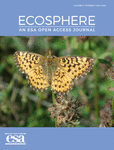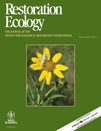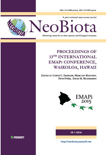
BIOLOGICAL INVASIONS
Scope & Guideline
Unraveling the complexities of ecological invasions.
Introduction
Aims and Scopes
- Ecological Impacts of Invasive Species:
Research articles explore the ecological consequences of invasive species on native biodiversity, ecosystem functions, and community structures, often employing experimental and observational studies. - Management and Control Strategies:
The journal emphasizes applied research that evaluates methods for managing invasive species, including biological control, habitat restoration, and policy implications. - Dispersal Mechanisms and Pathways:
Numerous studies investigate the pathways and mechanisms by which invasive species spread, including anthropogenic factors, natural dispersal, and climate change influences. - Genetic and Phenotypic Studies:
Research often includes genetic analyses to understand the adaptations of invasive species, their interactions with native species, and the implications of hybridization. - Social and Economic Dimensions:
The journal also addresses the socio-economic aspects of invasions, including public perceptions, economic impacts, and stakeholder engagement in management practices. - Climate Change Interactions:
A growing focus on how climate change affects the success and distribution of invasive species, and how invasive species, in turn, impact climate resilience.
Trending and Emerging
- Use of Environmental DNA (eDNA):
There is a rising trend in using eDNA for detecting and monitoring invasive species, allowing for more efficient and non-invasive sampling methods across diverse environments. - Interdisciplinary Approaches:
Research increasingly integrates ecological, genetic, and socio-economic perspectives to provide comprehensive insights into invasions and their management. - Climate Change and Invasive Species Interactions:
Studies focusing on the interplay between climate change and invasive species dynamics are gaining traction, emphasizing the need to understand how shifting climates affect invasion processes. - Community and Ecosystem Resilience:
Emerging research is exploring how invasive species affect community resilience and the potential for native species recovery following invasions. - Technological Innovations in Monitoring:
The application of remote sensing, machine learning, and other technological advancements is trending, enhancing the ability to predict and monitor invasive species distributions.
Declining or Waning
- Historical Case Studies of Invasions:
There is a noticeable decline in the publication of historical case studies that document past invasions, which previously provided context and lessons for current management strategies. - Focus on Single Species Studies:
Research concentrating exclusively on single invasive species is waning, as there is a shift towards understanding multi-species interactions and community-level impacts. - Laboratory-Based Research:
The reliance on laboratory experiments to study invasions is decreasing in favor of field-based studies that capture the complexity of ecological interactions in natural settings. - Regional Studies:
There is less emphasis on localized studies of invasions in specific regions, as the journal's focus expands to encompass broader, global perspectives on invasions.
Similar Journals

Ecosphere
Exploring the intricate web of life and its systems.Ecosphere is a leading open-access journal published by WILEY, dedicated to advancing research in the fields of ecology, evolution, behavior, and systematics. Established in 2010 and headquartered in the United States, this innovative journal provides a platform for the exchange of cutting-edge scientific knowledge and discovery, fulfilling its mission to enhance our understanding of ecological systems and their interactions. With a prestigious impact factor reflecting its commitment to high-quality research, Ecosphere is ranked Q1 in both Ecology and Ecology, Evolution, Behavior, and Systematics for 2023, further solidifying its prominence in the scientific community. The journal's scope includes a wide array of topics related to environmental science, making it an essential resource for researchers, professionals, and students aiming to stay at the forefront of ecological research. It offers comprehensive open access options, ensuring that groundbreaking findings are readily available to a global audience, thus fostering collaboration and innovation in the field.

RESTORATION ECOLOGY
Championing the Revival of Ecosystems WorldwideRESTORATION ECOLOGY is a leading international journal dedicated to the science and practice of ecological restoration, published by WILEY. With an ISSN of 1061-2971 and a robust E-ISSN of 1526-100X, this journal has successfully positioned itself within the top quartiles (Q1) in significant categories such as Ecology, Evolution, Behavior and Systematics, and Nature and Landscape Conservation, showcasing its high-impact contributions to these vital fields. RESTORATION ECOLOGY has been actively disseminating critical research since 1993 and continues to thrive as it converges toward 2024. Ranked impressively within Scopus, it stands at #98 out of 721 in Agricultural and Biological Sciences and #30 out of 211 in Environmental Science, emphasizing its substantial influence and reach. While the journal operates under traditional access guidelines, it serves as an invaluable resource for researchers, professionals, and students alike, aiming to advance knowledge and practical solutions for biodiversity conservation and ecosystem rehabilitation globally. For those interested in the intersection of ecological theory and practical restoration applications, RESTORATION ECOLOGY is a key outlet for fostering dialogue and collaboration.

GLOBAL ECOLOGY AND BIOGEOGRAPHY
Pioneering Research for a Sustainable FutureGLOBAL ECOLOGY AND BIOGEOGRAPHY is an esteemed academic journal published by Wiley that focuses on the dynamic interplay between ecological and biogeographical processes across the globe. With a strong commitment to advancing our understanding of biodiversity, conservation, and global change, this journal has secured a prestigious Q1 ranking in several categories, including Ecology, Ecology, Evolution, Behavior and Systematics, and Global and Planetary Change, highlighting its significant influence in the field. Since its inception in 1998, the journal has consistently provided a platform for high-quality research, featuring original articles that address critical ecological questions and emerging biogeographical trends. Researchers aiming to publish impactful work will appreciate the journal's rigorous peer-review process and its accessibility to a global audience. With a commendable track record reflected in its Scopus rankings, this journal is an essential resource for anyone dedicated to the study of ecology and biogeography.

Russian Journal of Biological Invasions
Unraveling the complexities of biological invasions.Russian Journal of Biological Invasions, published by PLEIADES PUBLISHING INC, is a pioneering periodical dedicated to advancing the understanding of biological invasions in diverse ecological contexts. With an ISSN of 2075-1117 and an E-ISSN of 2075-1125, the journal primarily serves the scientific community in the fields of ecology, evolution, behavior, and systematics, boasting a respectable Q3 categorization in Ecology for 2023 and ranking 559 out of 721 in its domain in Scopus. The journal's coverage spans from 2010 to 2024, addressing critical issues such as the ecological impacts of invasive species and offering insights into management strategies. Though not an Open Access journal, it provides invaluable resources for researchers, professionals, and students keen on tackling the challenges posed by biological invasions. Its contributions significantly enrich the discourse in ecological research and conservation efforts, making it an essential resource for those seeking to comprehend and mitigate the effects of invasive species on ecosystems across the globe.

Global Ecology and Conservation
Connecting researchers to inspire ecological stewardship.Global Ecology and Conservation, published by Elsevier, stands as a premier open-access journal dedicated to advancing the field of ecology and conservation science. Since its inception in 2014, the journal has facilitated the dissemination of high-quality research, fostering critical dialogue on ecosystem management, biodiversity preservation, and sustainability practices across the globe. With a remarkable ranking within the top quartiles (Q1) in various categories including Ecology, Evolution, Behavior and Systematics, and Nature and Landscape Conservation, it is positioned among the leading resources for researchers and professionals alike. The journal has garnered a notable impact, ranking #65 out of 721 in Ecology, and houses articles that are vital to understanding and addressing the pressing environmental challenges of our time. Available in an open-access format, researchers can freely access and share vital findings, promoting a collaborative approach to ecological research. Global Ecology and Conservation is not just a publication; it is a critical tool for innovation and advocacy in conservation, poised to inspire the next generation of environmental stewards.

Annual Review of Ecology Evolution and Systematics
Championing Rigorous Scholarship in Ecology and EvolutionThe Annual Review of Ecology, Evolution, and Systematics, published by Annual Reviews, is a leading academic journal dedicated to advancing the understanding of ecological and evolutionary processes. With a commendable impact factor and impressive rankings—9th in both the Ecology, Evolution, Behavior and Systematics category and the Environmental Science category—this journal is recognized for its rigorous peer-reviewed articles that synthesize research findings across a wide range of topics within the fields of ecology and evolutionary biology. Established in 2003, this annual publication aims to provide researchers, professionals, and students with comprehensive insights into the latest developments and trends within these dynamic disciplines. By facilitating access to high-quality scholarly articles, the Annual Review of Ecology, Evolution, and Systematics continues to play a crucial role in fostering scientific discourse and discovery.

WETLANDS ECOLOGY AND MANAGEMENT
Championing effective strategies for wetland preservation.Wetlands Ecology and Management, published by Springer, is an esteemed journal that has been advancing the field of wetland studies since its inception in 1982. Operating under the ISSN 0923-4861 and E-ISSN 1572-9834, this journal is headquartered in the Netherlands and serves as a critical resource for researchers, professionals, and students alike. It fosters interdisciplinary dialogue among aquatic science, ecology, and resource management disciplines, ranking in the Q2 category for Aquatic Science and Ecology, Evolution, Behavior and Systematics as of 2023. With a notable Scopus ranking, it is positioned favorably within the 65th percentile in Ecology and a commendable 58th percentile in Aquatic Sciences. The journal emphasizes the importance of effective management strategies and policies in the conservation of wetlands, making it indispensable for those aiming to drive impactful research. Although it is not an open-access journal, its high-quality publications remain accessible through library consortia and institutional subscriptions, ensuring that pertinent insights into the ecological dynamics and sustainable management practices are available to the global research community.

NeoBiota
Advancing ecological scholarship for a sustainable future.NeoBiota, published by Pensoft Publishers in Bulgaria, is a preeminent Open Access journal dedicated to advancing knowledge in biodiversity, ecology, and conservation science. Since its inception in 2011, it has established itself as a pivotal platform for scholarly discourse, maintaining an impressive impact factor that places it in the Q1 quartile across multiple categories, including Animal Science and Zoology, Aquatic Science, and Ecology. With its articles indexed in leading databases and Scopus rankings that affirm its standing (e.g., rank #12 in Animal Science and Zoology), NeoBiota serves as a vital resource for researchers, professionals, and students. The journal emphasizes the synthesis of ecological modeling and evolutionary processes, fostering interdisciplinary collaboration and promoting rigorous research methodologies. Authors are encouraged to contribute their insights on biodiversity metrics, ecosystem dynamics, and the ecological implications of anthropogenic changes, making NeoBiota essential for anyone invested in the future of our planet's ecosystems. Discover the treasures of ecological scholarship through this influential journal.

Ecological Complexity
Exploring the depths of complex ecological systems.Ecological Complexity is a prestigious academic journal published by Elsevier, dedicated to advancing the understanding of complex ecological systems through innovative modeling and analysis. With an ISSN of 1476-945X and an E-ISSN of 1476-9840, this journal has been a critical platform for researchers since its inception in 2004, with a forecasted operation until 2024. The journal enjoys an esteemed Q2 ranking in both the Ecological Modeling and Ecology, Evolution, Behavior and Systematics categories as of 2023, highlighting its significant impact and relevance in the field. Additionally, it ranks impressively in Scopus, with 85th out of 721 in the Ecology category and 11th out of 41 in Ecological Modeling, illustrating its commitment to high-quality research dissemination. While it does not currently offer Open Access options, Ecological Complexity remains a vital resource for ecologists, environmental scientists, and interdisciplinary researchers aiming to deepen their understanding of ecological interactions and systems. The journal is based in the Netherlands at RADARWEG 29, 1043 NX, AMSTERDAM, and serves as an essential forum for fostering innovative research that bridges theoretical concepts and practical applications in ecology.

AMPHIBIAN & REPTILE CONSERVATION
Advancing Conservation Through Cutting-Edge ResearchAMPHIBIAN & REPTILE CONSERVATION, published by the Amphibian Conservation Research Center & Lab, is a leading journal dedicated to the field of herpetology and environmental conservation. With an ISSN of 1083-446X and an E-ISSN of 1525-9153, this journal serves as a vital resource for researchers, conservationists, and students interested in the preservation of amphibian and reptile species. The journal has achieved remarkable rankings, categorized in the Q2 quartile for Animal Science and Zoology, Ecology, and Nature and Landscape Conservation as of 2023, reflecting its significant contribution to the scientific community. Over the converged years from 2016 to 2024, the journal has established itself as an integral platform for disseminating research findings, fostering collaboration, and enhancing the understanding of biodiversity and ecosystem dynamics. By embracing an open-access approach, AMPHIBIAN & REPTILE CONSERVATION ensures that critical research is readily available to a global audience, promoting informed conservation efforts and policy advocacy to safeguard these vital species amidst their declining populations.